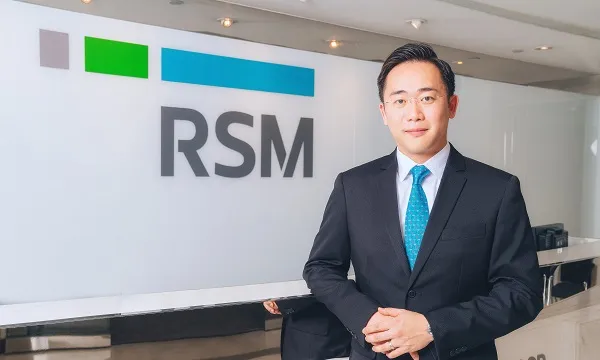
RSM Hong Kong Partner builds upon the city's reputation as a major hub
Jason Yau will join the panel of judges for this year’s HKB Technology Excellence Awards.
Jason Yau, Partner for Technology and Management Consulting at RSM Hong Kong, is a US certified public accountant in the state of New York and a certified information technology professional (CITP). Prior to his expat assignment, Jason was based in the RSM New York office, where he honed his expertise in providing audit and consulting to financial services companies.
Jason, who attributes his success to flexibility and adaptability, spearheaded RSM’s first Asia Pacific expat programme and subsequently established the technology and management consulting division in Hong Kong. He also oversees the internal IT department, responsible for the overall IT strategy, infrastructure, support, security, and data privacy matters. For him, one of the important elements for startups to thrive in a market is the adoptability of new products and services.
“Hong Kong, being an international hub, is very welcoming of new products and services, and the speed of adoption is very high as compared to other metropolises,” he says, adding that the world city should take advantage and heavily invest and incubate new startups with 5G focus.
In an interview with Hong Kong Business, Jason talks about the much needed government intervention to tap on GBA’s potential, the resilience of Hongkongers, as well as what profitable and sustainable in the future
Can you share with us your work experience and backstory that contributed to your professional career?
I started my career in New York with Salomon Smith Barney, the investment banking arm of Citigroup back before joining New York Mercantile Exchange as a regulator. In 2004, I took my talent to RSM US and subsequently expatriated to RSM Hong Kong in 2012. Throughout my last few years, I have been mainly involved with cross-border projects, supported our international strategy in the Greater China region and built a new IT advisory practice from the ground up for RSM Hong Kong. I felt the backstory that contributed to my professional career mainly lies with my flexibility and adaptability, which allows me to capture the right opportunities at the right moment.
HKSTP announced that 108 startups just graduated their incubation programmes. What’s your view on Hong Kong’s startup ecosystem? Which new products or services do you think would thrive post-crisis, especially with 5G on the table?
Hong Kong’s startup ecosystem has come a long way—we have seen the momentum pickup in the last few years and witnessed the birth of a few unicorns. One of the important elements for startups to thrive in a market is the adoptability of new products and services. Fortunately, Hong Kong, being an international hub, is very welcoming of new products and services, and the speed of adoption is very high as compared to other metropolises. As for the 5G element, we all know that there will be a lot of by-products derived from this new infrastructure, and I think Hong Kong should heavily invest and incubate new startups with 5G focus right now. In the startup world, sometimes it is not about whether you are the best—it’s more about who is the quickest to get there and reach the market.
HKMA and others recently floated a wealth management connect scheme to attract cross-border investments. What roles does the Greater Bay Area play in Hong Kong’s position as a financial and innovation hub?
First and foremost, the Greater Bay Area will certainly expand Hong Kong’s market position as a financial and innovation hub. There should be favourable government policies and schemes to accelerate collaboration in alignment with the development plan. These favourable policies shall assist in removing a lot of the existing boundaries/hurdles for doing business between Hong Kong and China. From the financial hub perspective, Hong Kong should continue to position ourselves as a free market with reliable professionals and sound legal systems for investing and doing business. As from the innovation hub perspective, Hong Kong should tap into the talents in the Greater Bay area and use the Greater Bay area infrastructure as a springboard to engage into the Chinese market.
Hong Kong has one of the most financially literate markets in the globe, says IFEC, but how is the country coping and which industries are staying resilient in these trying times?
Our city is certainly one of the most financially literate markets and has been extremely resilient in riding through different crises. One of the main reasons is our people, who are agile, innovative and responsible. With the ongoing changes in the world and to our city, I believe Hong Kong will remain resilient due to the exceptional people we have.
Aside from doubling down on tech and digital innovations, what do firms need to consider to become more profitable and sustainable in the future?
Investment in talents. Many traditional business models will be disrupted, and so do our jobs. Our job responsibilities will be enhanced from plain processing to analysing, problem solving and decision making. The processing part of our job will be replaced by automation solutions, and the new expectation from the job is how human workers can deliver more value by generating growth. As for sustainability, it would require corporate leaders to take a long-term approach in making sound investment and corporate decisions—such as investment in digital innovations, automations, green initiatives, ESG programmes, etc.








![Cross Domain [Manu + SBR + ABF + ABR + FMCG + HBR + ]](https://cmg-qa.s3.ap-southeast-1.amazonaws.com/s3fs-public/styles/exclusive_featured_article/public/2025-01/earth-3537401_1920_4.jpg.webp?itok=WaRpTJwE)









 Advertise
Advertise


